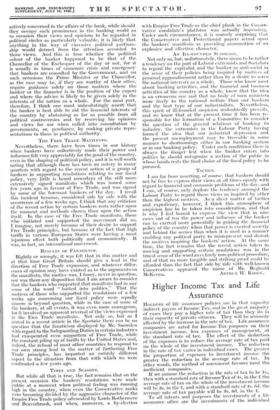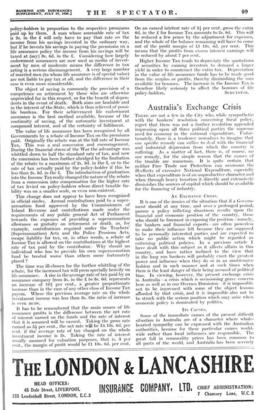Higher Income Tax and Life Assurance
lloanEas of life assurance policies are in that capacity indirect payers of Income Tax, and in the great majority of cases they pay a higher rate of tax than they do in their capacity of private citizens. They will be seriously affected by the increase in the rate of tax. Life assurance companies arc rated for Income Tax purposes on their investment income, less expenses of management, at the standard rate of tax. The effect of the deduction of the expenses is to reduce the average rate of tax paid on the whole of the investment income. The reduction in the rate of tax varies in individual eases. The greater the proportion of expenses to investment income the greater the reduction in the average rate of tax. In other words, the method of assessment favours most the inefficient companies.
If we assume the reduction in the rate of tax to be Is., then with a standard rate of IncomeTak of 4s. in the E the average rate of tax on the whole of the investment income will be 8s. in the £, and with a standard rate of 4s. 6d. the average. rate of tax payable will be 8s. 6d. in the £.
To all intents and purposes the investments of a life assurance office are' the investments of the individual policy-holders in proportion to the respective premiums- paid up by thein. A. man whose assessable rate of tax is 2s: m the £ will only have to pay that rate on the income from his savings invested in the ordinary way, but if he invests his savings in paying the premiums on a life assurance policy the income from his savings will be taxed at (say) 8s. 6d. in the Z. Considering how largely endowment assurances are now used as media of invest- ment by men of moderate means the difference in tax rating is a serious discouragement. A very large number of married men (to whom life assurance is of special value) are not liable to pay. tax at all,- and the difference in their case is even more considerable.
The object of saving is commonly the provision of a competence on retirement by those who are otherwise unprovided for in this respect, or for the benefit of depen- dents in- the event of death. Both aims are laudable and in the interest of the State, which is thus relieved of possi- ble burdens. For their achievement life endowment assurance is the best method available, because of the continuity of saving, of the automatic investment at compound interest, and of the certainty of fulfilment.
The value of life assurance has been recognized by all Governments by a rebate of Income Tax on the premiums paid. Originally the rebate was at the full rate of Income Tax. This was a real concession and encouragement. During the financial stress of the War the advantage was whittled down to half the standard rate of tax, and now the concession has been further abridged by the limitation of the rebate to a maximum of 2s. 3d. in the £, or to the rate of tax actually paid by the policy-holder if this be less than 2s. 3d. in the I. The introduction of graduation into the Income Tax really changed the nature of the rebate from a concession into compensation for the higher rate of tax levied on policy-holders whose direct taxable lia- bility was on a smaller scale, or even non-existent.
This change does not appear to have been recognized in official circles. Annual contributions paid to a super- annuation fund approved by the Commissioners of Inland Revenue and contributions made under the requirements of any public general Act of Parliament towards the . expenses of providing a superannuation allowance or gratuity on retirement or death, as, for example, contributions required under the Teachers' (Stiperannuation) Acts and the Police Pensions Acts, escape liability for tax, or, in other words, a rebate of Income Tax is allowed on the contributions at the highest rate of tax paid by the contributor., Why should an individual who has to provide his own superannuation fund be treated worse than others more fortunately placed ?
The time was ill-chosen for the further whittling of the rebate, for the increased tax will press specially heavily on life assurance.. A rise intim average rate of tax paid by an assurance company from 3s. in the £ to 3s. 6d. represents an increase of 163 per cent., a greater proportionate increase than in the case of any other class of Income Tax payers. Where the previous average rate on the whole investment income was less than 3s. the ratio of increase is even more.
It has to be remembered that the main source of life assurance profits is the difference between the net rate of interest earned on the funds and the rate of interest that it is assumed will be earned. Taking the gross rate earned as-5i per cent., the net rate vrIll.be £4.13s. 6d. per cent. if the average rate of tax charged . on the whole investment income is 3s. Taking the rate of interest usually assumed for valuation purposes, that is, 3 per cent., the margin of profit would be £1 I3s. 6d. per cent.
On -an earned interest rate of 533- per cent. gross the extra: 6d. in the £ for Income Tax amounts to 2s. 9d. This will be reduced a few pence by the adjustment for expenses, and the whole of the balance remaining will have to come. out of the profit margin of £1 18s. 6d. per cent. This means that the profits from excess interest earnings will- be reduced by about 7 per cent.
Higher Income Tax tends to depreciate the quotations of securities by causing investors to demand a larger. yield in order to counteract the extra tax. Depreciation' in the value of life assurance funds has to be made good, from the surplus or profits, thereby diminishing the sum. available for bonuses. The increase in the Income Tax is. therefore likely seriously to affect the bonuses of life

















































 Previous page
Previous page